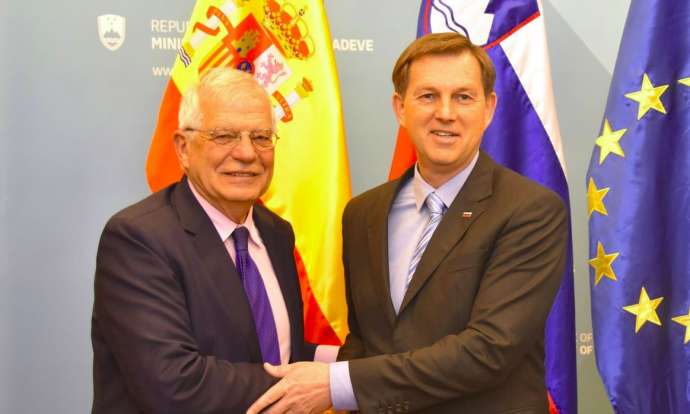STA, 9 April 2019 - Foreign Minister Miro Cerar and his visiting Spanish counterpart Josep Borrell supported an orderly Brexit as the best option after talks in Ljubljana on Tuesday, indicating they were not opposed to another delay. The pair expressed their countries' mutual interest in a further enhancement of bilateral ties.
"A no-deal Brexit is not desired but it's not a horror," the Spanish minister told a joint press conference in response to a question by a Spanish journalist whether he would prefer a horrible end to Brexit or an eternal horror.
He added that he did not find another Brexit extension a horror because it would not be infinite, and that "Brexit will have an end."
Cerar agreed that everyone favoured a Brexit based on a deal. "Should there be a no-deal Brexit, Slovenia will be ready for it, although we don't want it, because a consensual path is the better path," he said.
Slovenia can understand the UK's desire to delay Brexit, but it is necessary to ensure a stable and efficient functioning of EU institutions in the future, Cerar said, adding that extending the Brexit deadline would be sensible unless it led to a crisis of EU institutions, thus harming the UK and the rest of the EU.
"The 27-nation bloc cannot become hostage to the United Kingdom because of their uncertainty, that is a situation in which they don't see yet how to implement Brexit in a right way," Cerar said.
Današnji obisk MZZ Španije @JosepBorrellF dodatno utrjuje prijateljske odnose med ?? in ??. Ohraniti želimo pozitiven trend krepitve gospodarske rasti in nadaljno rast turistične izmenjave. @MZZRS @SLOinESP pic.twitter.com/R8Dsl5x3l5
— dr. Miro Cerar (@MiroCerar) April 9, 2019
Cerar said he and Borrell agreed it was important for the EU to remain united, closely integrated and that EU member countries continue to cooperate well with each other.
This is why it is important to have a good turnout in the EU elections, to tell people it is important to live together and that there is a desire to prevent divisive forces from prevailing, in order to preserve peace for the future generations.
The ministers also called for strengthening further what they said was already a good bilateral relationship between their countries. Cerar said Slovenia was keen to preserve a positive trend of trade seen in 2017 and 2018, when the volume of merchandise trade reached 1.2 billion euro.
They also hailed a strengthening of tourism exchange between the two countries and the fact that Slovenia was a popular destination for Spanish Erasmus exchange students and Spain ranked as the most popular destination for Slovenian students.
Borrell thanked Slovenia for understanding over the Catalonia issue.
Asked about the trial of the imprisoned independence leaders, he said it was not a political process but a trial of the politicians who had responsibilities. "They may have a responsibility of a criminal nature, but it is up to judges to decide."
Cerar said that Slovenia was following the developments and that the procedures must be conducted in accordance with Spanish legislation and the rule of law. "It's an internal affair of the Spanish judiciary that we cannot interfere in, although we wish for a conclusion," Cerar said.
Catalonia's expectations for more independence were also one of the topics discussed as Borrell was received by President Borut Pahor.
Borrell presented the current situation in Spain before the upcoming early elections and the government's efforts for dialogue, Pahor's office said in a press release.
Other topics included the excellent and friendly bilateral relations, as well as the EU and Brexit, and the situation in the Western Balkans.
The pair shared a view that the EU should be strengthened so that it can provide for security, progress and welfare.
Pahor hopes May's EU election result will enable the European Parliament to form a strong and pro-European coalition willing to face up to future challenges.
He reiterated his view that these will be the most important elections to the European Parliament since they were first held in 1979.
Pahor also told Borrell he was in favour of an orderly Brexit to minimise negative consequences for the citizens and economies of both countries.
The pair exchanged views on the EU prospects of the Western Balkans and potential incentives for the region to continue with reforms despite a slowdown in enlargement.
Pahor reiterated his view the enlargement should be seen as a geopolitical question rather than a technical issue.






